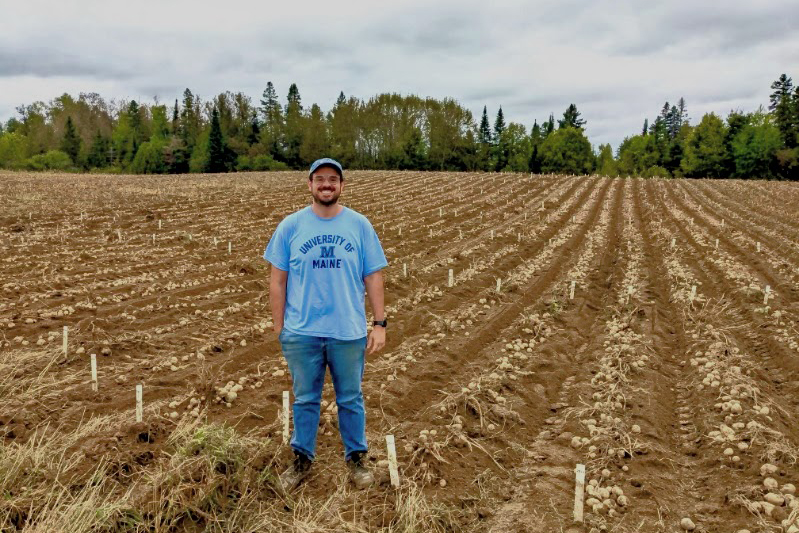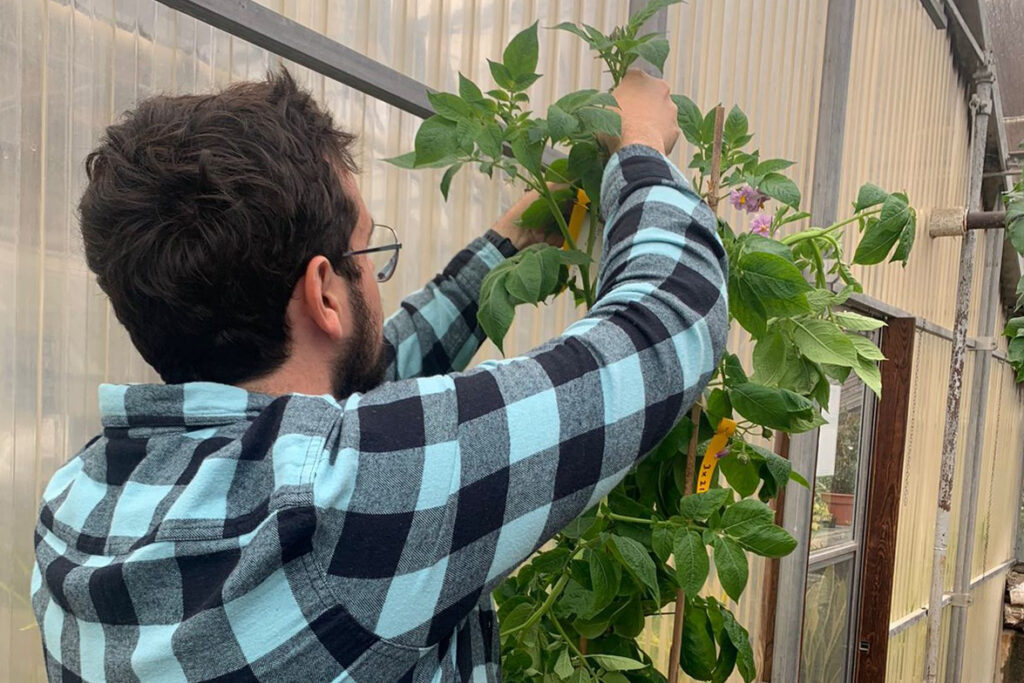
DNA science is gaining ground in agriculture, and researchers are using it to develop potatoes that will thrive in Maine’s changing climate.
It’s all part of the University of Maine’s potato breeding program headed by Mario Andrade, assistant professor of potato breeding and genetics. Andrade recently took over running the program from Gregory Porter, who retired at the end of 2023 after 38 years at UMaine.
Weather extremes are already affecting Maine’s crops. Severe drought in 2020 and 2021 prompted government disaster relief. Last year saw the opposite, when constant rain damaged hay, delayed planting and caused worries about potato yield. Potato research, most of which happens at the Aroostook Farm in Presque Isle, is what scientists and the industry say is crucial to keep Maine’s No. 1 food crop stable and profitable.
“The next years will be very unpredictable. I think it’s already a reality for us, that we cannot count on the weather anymore,” Andrade said from his family’s home in Brazil. “One thing Greg and I talk about a lot is we need to be prepared for changes with the climate.”
The key is to create new strains and varieties to withstand bugs, diseases — and weather. Maine has joined scientists around the world in addressing climate change. The state is forecast to become warmer and wetter, and the 2023 growing season was a perfect example.
Andrade, who did doctoral work in both Brazil and Florida, joined the Orono campus in March. He has been working with Porter, who had led the university’s potato breeding effort since 2007. The two will continue to collaborate as Porter wraps up some projects.
Andrade has already been to Aroostook County. In fact, in 2022 he lived for four months in Washburn, visiting the Presque Isle research farm and getting to know local growers and their operations. It was easy to see the potato industry is huge in The County and in Maine, he said.

He was impressed with the technology farmers use, how much land they have and how well they manage the soil, which is much rockier than in Brazil, he said.
“It’s very different from Brazil and Florida, and one thing is that there is a very narrow window for harvest,” Andrade said. “They need to harvest very fast to avoid the frost.”
Andrade received his bachelor’s degree in agronomy and his master’s and doctorate in potato breeding. He spent a year as a research scholar at the University of Florida and two years in a Florida forage crop breeding laboratory, working with alfalfa.
In hot climates, diseases have more chances to develop, so breeding must focus on heat tolerance and disease and pest resistance.
Maine doesn’t have the heat problem, but drought and excess moisture are its major concerns, he said.
To develop better performing potatoes, UMaine sends seeds to be planted in test plots in Florida and South Carolina. They plant the same strains in Presque Isle. By gathering data after harvest, they can determine which plants best tolerated climate nuances in each location.
Using DNA to help advance potato breeding will be Andrade’s first big project, he said. It’s a continuation of work Porter started about three years ago, and the process can shave two to three years off the normal 12 years it takes to release a new variety.
Scientists extract the DNA from plant leaf samples and develop mathematical models that show how the plants will perform, he said. That eliminates some of the time-consuming study along the way.
Right now UMaine has DNA information and field performance notes from nearly 1,000 potato plants. Andrade will use that information to predict what varieties could perform best next year, he said.
DNA science is widespread in corn and soybeans, but it’s been slower to start in potatoes. That’s because the DNA is more complex and potato plants have many more possible combinations to be investigated, he said.
There’s other big news at the Aroostook Farm. UMaine and the farm will join other states in using a $1.4 million grant from the United States Department of Agriculture to develop climate-resistant potato varieties.
“I was very fortunate when I started the job that UMaine has this project ongoing,” Andrade said. “Greg Porter had amazing success at the farm, so they saw great potential in investing in the farm.”
The funds will help the farm renovate its phenotyping lab, which measures traits of potato plants: their starch content, maturity rate, yield and other characteristics. New automatic graders and sorters will make research more efficient and produce higher quality potatoes, he said.
The money solidifies the farm and the breeding program. In 2022, a Biden administration proposal suggested cutting potato breeding funding. Thanks to support from U.S. Sen. Susan Collins and money from the Maine Potato Board, Potatoes USA and now the department of agriculture, the farm is secure at least through 2025, Andrade said.
Though he hasn’t experienced a full Maine winter yet, Andrade has found the people kind and welcoming. He hopes to bring his fiancee for a visit next year, and to have his mother come to see snow for the first time.
It’s already obvious how much the potato industry supports the breeding program, he said. And that’s important not only for Maine, but for potato growers nationwide.
For instance, Maine’s Caribou Russet has exploded beyond state borders and is the 12th most planted potato in the U.S., he said. The Lamoka variety, which UMaine helped Cornell University engineer, is in the top 10.
“We have a good relationship among the researchers,” he said. “If they should stop funding these programs, the entire country would suffer a loss.”







